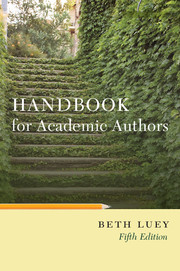Book contents
- Frontmatter
- Contents
- Illustrations
- Preface to the Fifth Edition
- Preface to the Fourth Edition
- Preface to the Third Edition
- Preface to the Second Edition
- Preface to the First Edition
- Chapter 1 The Publishing Partnership
- Chapter 2 Journal Articles
- Chapter 3 Revising a Dissertation
- Chapter 4 Finding a Publisher for the Scholarly Book
- Chapter 5 Working with Your Publisher
- Chapter 6 Multiauthor Books and Anthologies
- Chapter 7 Finding a Publisher for the College Textbook
- Chapter 8 Working with Your Textbook Publisher
- Chapter 9 Books for General Readers
- Chapter 10 The Mechanics of Authorship
- Chapter 11 Costs and Prices
- Chapter 12 Born Digital
- Bibliography
- Index
Chapter 4 - Finding a Publisher for the Scholarly Book
Published online by Cambridge University Press: 02 December 2010
- Frontmatter
- Contents
- Illustrations
- Preface to the Fifth Edition
- Preface to the Fourth Edition
- Preface to the Third Edition
- Preface to the Second Edition
- Preface to the First Edition
- Chapter 1 The Publishing Partnership
- Chapter 2 Journal Articles
- Chapter 3 Revising a Dissertation
- Chapter 4 Finding a Publisher for the Scholarly Book
- Chapter 5 Working with Your Publisher
- Chapter 6 Multiauthor Books and Anthologies
- Chapter 7 Finding a Publisher for the College Textbook
- Chapter 8 Working with Your Textbook Publisher
- Chapter 9 Books for General Readers
- Chapter 10 The Mechanics of Authorship
- Chapter 11 Costs and Prices
- Chapter 12 Born Digital
- Bibliography
- Index
Summary
It circulated for five years, through the halls of fifteen publishers, and finally ended up with Vanguard Press, which, as you can see, is rather deep into the alphabet.
Patrick Dennis, on Auntie MameTypes of Book Publishers
Scholarly books are issued by six types of publishers: university presses, profit-making scholarly publishers, trade publishers, university centers and learned societies, vanity presses, and online self-publishing services. These types of publishers differ in their refereeing procedures, to some extent in the kinds of works they publish, in their approaches to marketing, and in the contractual arrangements they make with authors. Despite some overlap, they serve different purposes, and authors should understand the differences before deciding where to seek publication.
University Presses
University presses are the main outlet for book-length scholarly work. They are nonprofit publishers. Most university presses are self-supporting or have a small part of their costs underwritten by the sponsoring institutions and by occasional grants from private foundations or government agencies. Some have raised general endowments or endowments for books in certain fields. About one hundred university presses in the United States and Canada belong to the Association of American University Presses (AAUP); a few small university presses are not members of the AAUP.
A university press disseminates knowledge by publishing books and journals in print and electronic formats. In its search for the best in new scholarship, a university press encourages research and writing.
- Type
- Chapter
- Information
- Handbook for Academic Authors , pp. 45 - 67Publisher: Cambridge University PressPrint publication year: 2009



